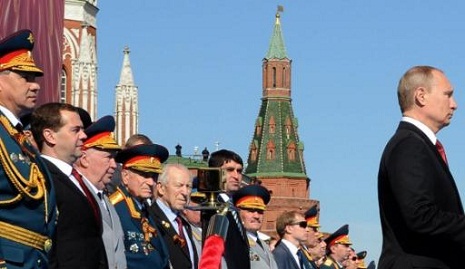Putin on Parade

Yet, though Russia’s WWII allies were from Europe and North America, no Western leaders will attend the commemoration – a reflection of the West’s disapproval of Putin’s invasion of Ukraine and annexation of Crimea. Instead, Russian President Vladimir Putin’s high-profile guests will include the leaders of China, India, and North Korea, underscoring just how few friends Russia has these days.
The surreal nature of this gathering reflects the increasingly bizarre nature of Putin’s regime. Indeed, watching Russia nowadays is like watching the last installment of the X-Men film franchise, “Days of Future Past.” Just as the X-Men in that film join forces with their younger selves to save mankind’s future, today’s Kremlin is harking back to Russia’s Soviet past in what it sees as a contemporary fight for the country’s survival.
Critical to this strategy is propaganda conflating the West today with the Germans who invaded Russia in 1941, while painting Ukrainian government officials as “fascists” and “neo-Nazis.” The Kremlin has relied on such claims, together with the supposed need to defend Russians abroad, to justify its aggression against Ukraine. In Putin’s speech following the annexation of Crimea, he charged that the West’s refusal “to engage in dialogue” left Russia with no choice. “We are constantly proposing cooperation on all key issues,” he declared. “We want to strengthen our level of trust and for our relations to be equal, open, and fair. But we saw no reciprocal steps.”
A month later, Putin reinforced this image of Russians as the morally superior victims of a cruel and uncompromising West. “We are less pragmatic than other people, less calculating,” he asserted, before adding that Russia’s “greatness” and “vast size” means “we have a more generous heart.”
It is not difficult to see the parallels between Putin’s approach and that of Joseph Stalin, who declared at the start of WWII that the “enemy” aims to “destroy” Russia’s “national culture,” to “Germanize” its people, and “convert them into slaves.” The difference, of course, is that the Nazi Wehrmacht actually invaded the Soviet Union, whereas Ukraine simply wanted to decide its own future.
Without defending Stalin, one must recognize the immense Soviet contribution – including the lives of 26 million citizens – to the Allied victory in WWII. At the time, the military parade in Red Square – featuring almost 35,000 troops, up to 1,900 pieces of military equipment, and a 1,400-man orchestra – was a well-deserved pageant. The Soviet leadership spared no cost in staging its military displays, which, in the absence of an external military threat, became an important vehicle for rallying national unity.
After the Soviet Union’s collapse, Russia, no longer a superpower, put its military spectacles on ice. But in 2005, to commemorate the 60th anniversary of the end of WWII, Putin held a major parade – one that Western leaders, believing that Russia might have a European future, did attend.
The tone of this year’s Victory Day commemorations is far less anticipatory. How can one celebrate the end of a war at a time when the descendants of those who fought it (undoubtedly driven by the hope that future generations would live in peace) are killing one another in a brutal little war in eastern Ukraine? What is the point of grandiose fireworks displays amid the firing of real howitzers and rockets?
The historian Robert Paxton believed that one could tell much about a country by its parades. His 1966 book Parades and Politics at Vichy describes how Philippe Pétain, as Chief of State of Vichy France, used pageantry, reactionary politics, and, of course, a partnership with Adolf Hitler to dupe his defeated country into believing that it still mattered in the world. The Vichy state’s brand of authoritarian traditionalism lionized family and fatherland, with Pétain, a former military commander, serving as a kind of military king, exalted on the tribune.
The parallels with Putin’s Russia are clear. Putin views himself as a new czar. His KGB background dictates his leadership style, which includes the abolition of free and fair elections, the persecution of opponents, and the promotion of conservative values that he, like Pétain before him, juxtaposes with the corrupting influence of an “immoral” and “decadent” West.
Relying on this approach, Putin has built alliances with the likes of Syria’s President Bashar al-Assad and Egypt’s military ruler Abdel Fattah el-Sisi. China, the world’s second largest economy, is a useful addition to this collection of friendly anti-democratic states, as it has its own strategic grievances with the West.
Unlike China, however, Russia is not a rising superpower. Putin may try to portray his actions in Ukraine as a fight against fascism. But it is really a fight for relevance – a fight he will never win. No matter how grand the parade, he cannot hide the truth: Russia’s days as a superpower are in the past. Putin’s patriotism, like Pétain’s, is that of the vanquished.















































